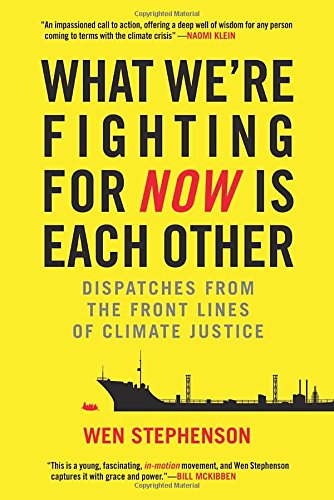
What We're Fighting for Now Is Each Other
Dispatches from the Front Lines of Climate Justice
کتاب های مرتبط
- اطلاعات
- نقد و بررسی
- دیدگاه کاربران
نقد و بررسی

August 17, 2015
With an apocalyptic tone, journalist and climate activist Stephenson introduces the work of fellow activists, environmental scholars, and frontline community organizers in this substantial volume on the
climate justice movement. Stephenson
considers climate change “the most fundamental and urgent threat humanity has ever faced,” and faults “the fossil-fuel industry and those who do its bidding” as they “deceive the public, and willfully obstruct any serious response to the climate catastrophe.” When Stephenson shifts the focus to comrades in the fight, the conversation gets more interesting. Among the leaders and foot soldiers Stephenson presents are Tim DeChristopher, a climate activist in Salt Lake City jailed for disrupting a Bureau of Land Management auction of oil and gas drilling leases; longtime environmentalist Wendell Berry, whose 1979 essay “The Gift of Good Land” makes “a Biblical argument for ecological and agricultural responsibility”; and Beverly Wright, a New Orleans native who helped document “the deep structural and environmental racism” many African Americans experience in communities along the Mississippi River. There is plenty of harsh language, which may turn off some audiences, but others will be glad to see Stephenson promoting the work and commitment of an array of activists engaged in what is often a thankless battle.

August 15, 2015
An environmental scolding by climate activist Stephenson. Yes, we've trashed the planet. Yes, we're too busy doing our own thing to care. Yes, "it's homicidal. It's psychopathic. It's fucking insane." From a pulpit alongside Walden Pond, former Atlantic and Boston Globe editor Stephenson preaches these things righteously. The problem is, as he recognizes, that anyone likely to read this book is already likely to be converted, and it's not the choir that needs the sermon. So it is that the author enlists other voices, climate and environmental activists who are doing interesting and useful things in the world, such as a New Orleans activist who has been chronicling the legacy of environmental racism along what's called Cancer Alley and a Harvard Divinity student who's done jail time for his direct actions. The project could have been a nicely Terkel-ian oral history, and such a book is much needed, but Stephenson is inclined to interpolate to the point that, most often, a paragraph of talking is followed by a paragraph of gloss. That gets tiresome, and it's unfortunate, since some of the (mostly young) people being profiled have much to say, including one who quite rightly notes that many environmental issues pack more than one problem: racial injustice, economic inequality, food insecurity, and other issues often go hand in hand and resist easy solutions. Stephenson is to be commended for bravery in offering case studies that may well inspire monkey-wrenching, if not the constitutional convention one activist hopes for. He also risks being ridiculed for a few rhetorical stretches, as when, a stack of qualifiers to the side, he likens the environmentalists of today to the abolitionists of 1850s America. He gets points for acknowledging those stretches but demerits for having committed them in the first place. Earnest and well-meaning but unlikely to sway climate deniers, Monsanto lobbyists, and others in need of convincing.
COPYRIGHT(2015) Kirkus Reviews, ALL RIGHTS RESERVED.

October 1, 2015
Stephenson tackles the climate crisis from a personal position in a work that combines memoir, political outrage, philosophical consideration, and interviews with diverse members of the environmental movement. He presents himself as a man who sees the need for engagement in the world but is perplexed by the complexities of the global warming crisis and differing opinions about how it should be tackled. Walking in the footsteps of Thoreau, he seeks clarity and sets out to meet people who have immersed themselves in the movement to save the world. Familiar names are here, most notably Bill McKibben (Oil and Honey, 2013), but Stephenson also talks with local activists not known outside places such as Port Arthur, Texas. His journey eventually takes him to Tim DeChristopher, now a student at Harvard Divinity School, who famously served time in federal prison for disrupting a BLM auction for oil- and gas-drilling leases. Readers will feel that they've traveled along with Stephenson and will likely be as transformed as he was as they think about what they might contribute to the environmental movement.(Reprinted with permission of Booklist, copyright 2015, American Library Association.)

























دیدگاه کاربران